To mark his 5th death anniversary on April 29, Sunday mid-day travelled to Hiruchiwadi in Igatpuri—a village where Irrfan’s farmhouse lies untouched, and his legacy of generosity and kindness is still valued
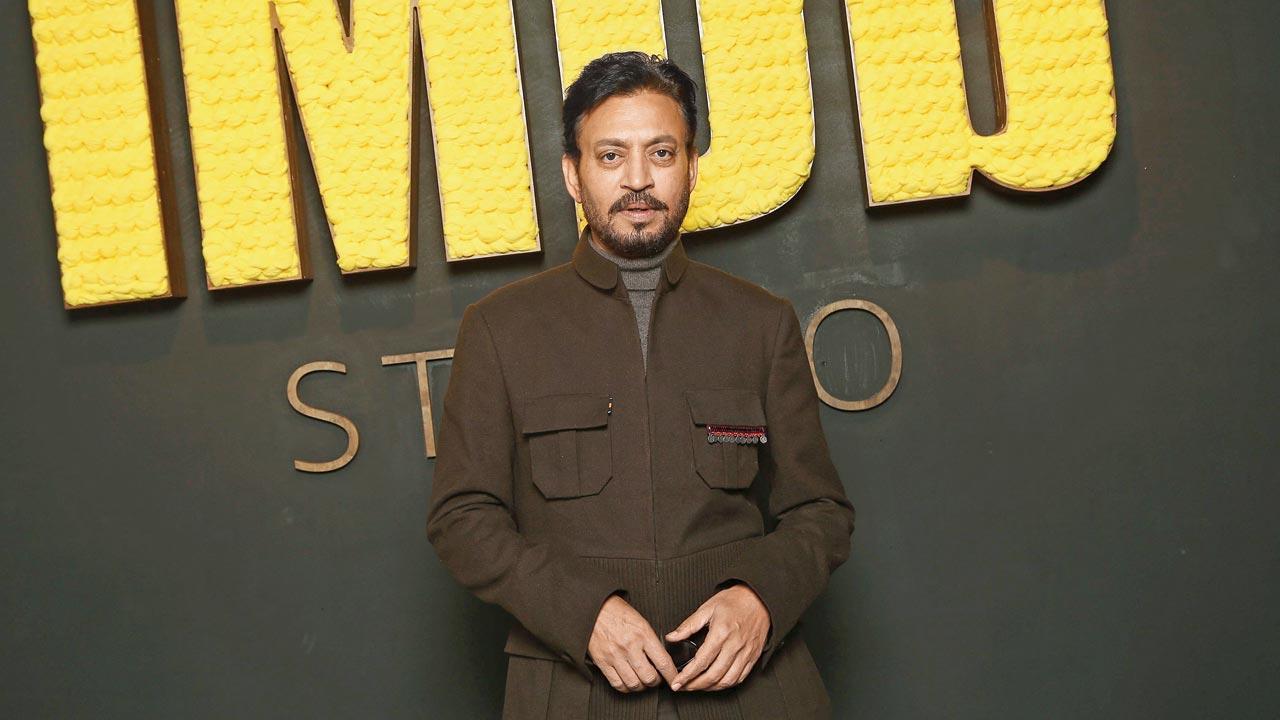
Late actor Irrfan
In 2010, when the late actor Irrfan bought a land parcel in a tiny hamlet in the lap of the scenic Sahyadri range in Igatpuri taluka of the Nashik district, very few people knew of him here.
By then, he was already an international star, having worked in Danny Boyle’s Oscar-winning film Slumdog Millionaire (2008), and classics such as Asif Kapadia’s The Warrior (2001), Vishal Bhardwaj’s Maqbool (2003), and Mira Nair’s The Namesake (2006), apart from many other Hindi box office hits.
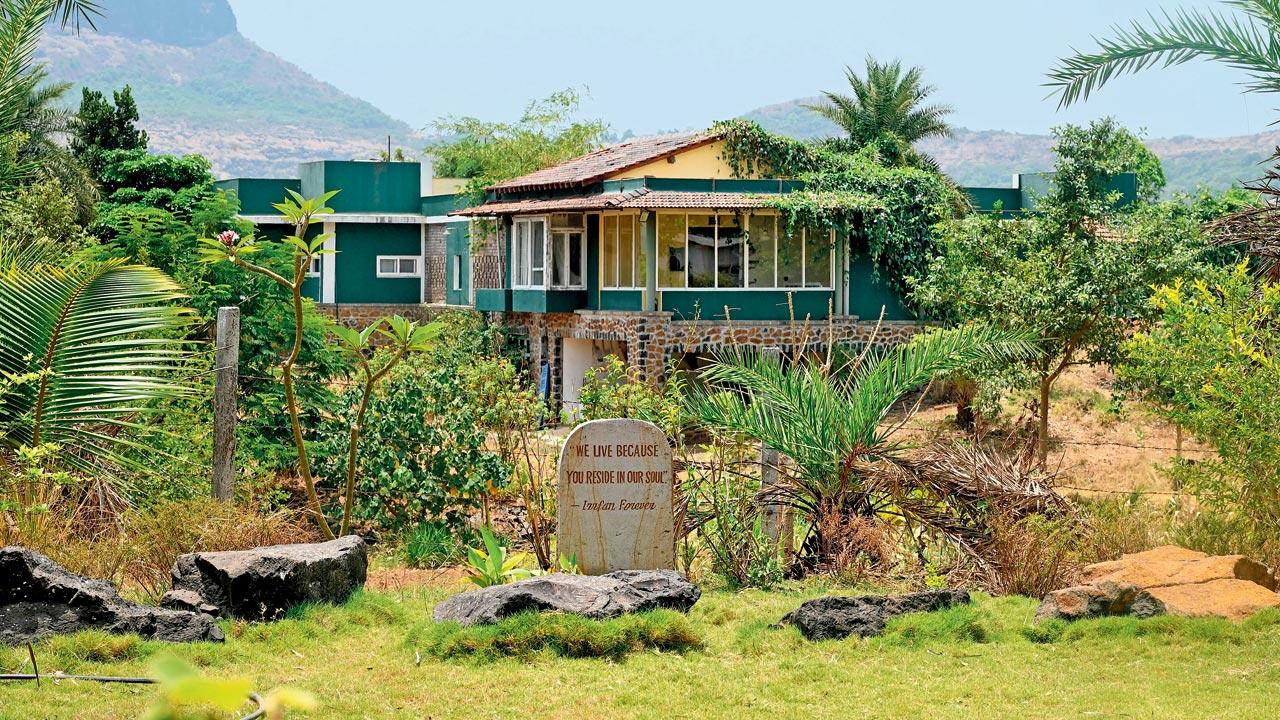 Irrfan’s farmhouse in Hiruchiwadi, Igatpuri—where he helped the village grow and found a second family. Pics/Satej Shinde
Irrfan’s farmhouse in Hiruchiwadi, Igatpuri—where he helped the village grow and found a second family. Pics/Satej Shinde
It’s no surprise that people didn’t know him here, given that televisions are still a rarity in this tribal village called Hiruchiwadi. In the era of 5G connectivity, the network here is spotty, with just 3G connectivity if you’re in the right spot. When we asked a local farmer, Revati, 28, when was the last time she had watched a film, she responded, “Mee kadhi chitrapat naahi baghitla (I have never watched a film).” However, she came to know about Irrfan after he moved here, as he socialised with the villagers quite often.
It may be bewildering to many, but films are not the main source of entertainment in this tribal village. The closest film theatre from here, Victory Cinema, is around 11 km away, near Igatpuri railway station. With no state transport facility to connect Hiruchiwadi, travelling outside the village is not an everyday affair for everyone. Adults who have two-wheelers and a few families with cars are the only ones who frequently travel towards the city side.
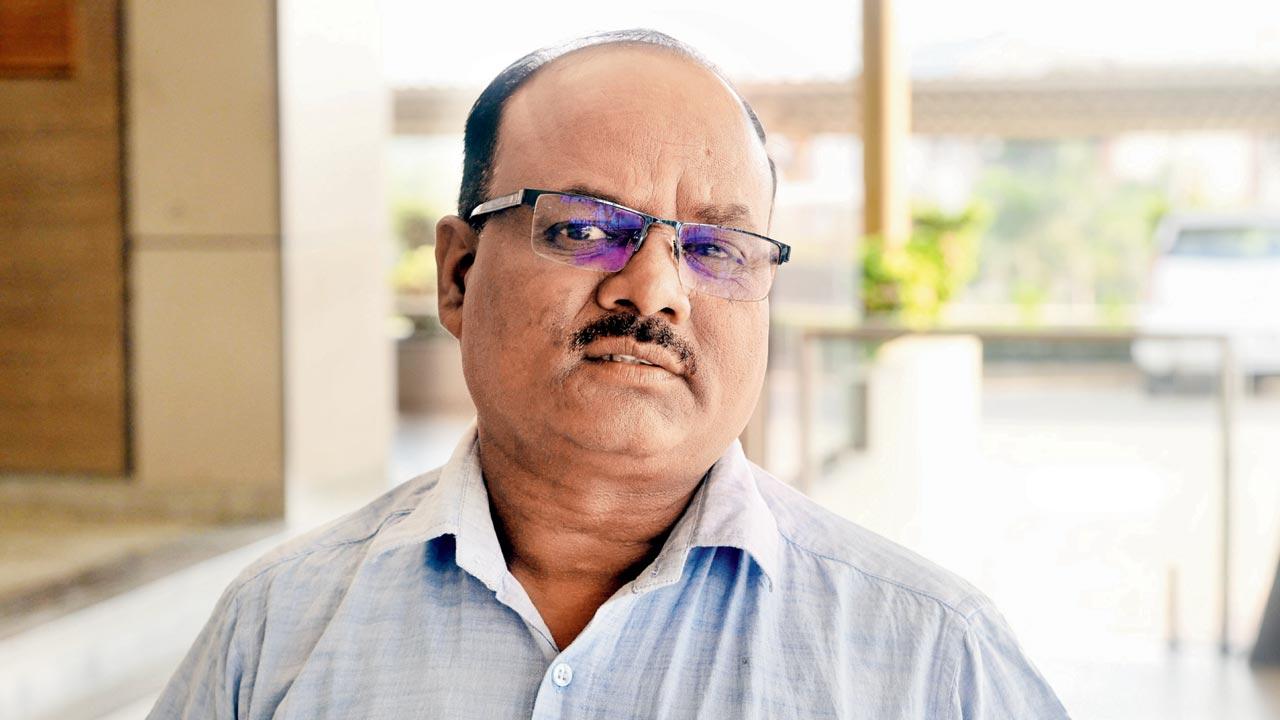 Bhavrao Bandu Bangar, headmaster
Bhavrao Bandu Bangar, headmaster
Though just 120 kilometres from Mumbai, this tribal hamlet feels light-years away from modernity, still living in the 1990s. Old Hindi film music can still be heard on the radio sets if you stroll through the village on a quiet afternoon. The Sahyadri range surrounding it from all sides protects it in its soft fists, much like a mother coddles a baby in her lap.
It’s probably this simplicity and rawness that appealed to Irrfan, and he chose to build his farmhouse here, which was completely ready by 2015. It’s a perfect escape from the glitz and glamour of Mumbai, a city that always kept him busy and where everyone knew him.
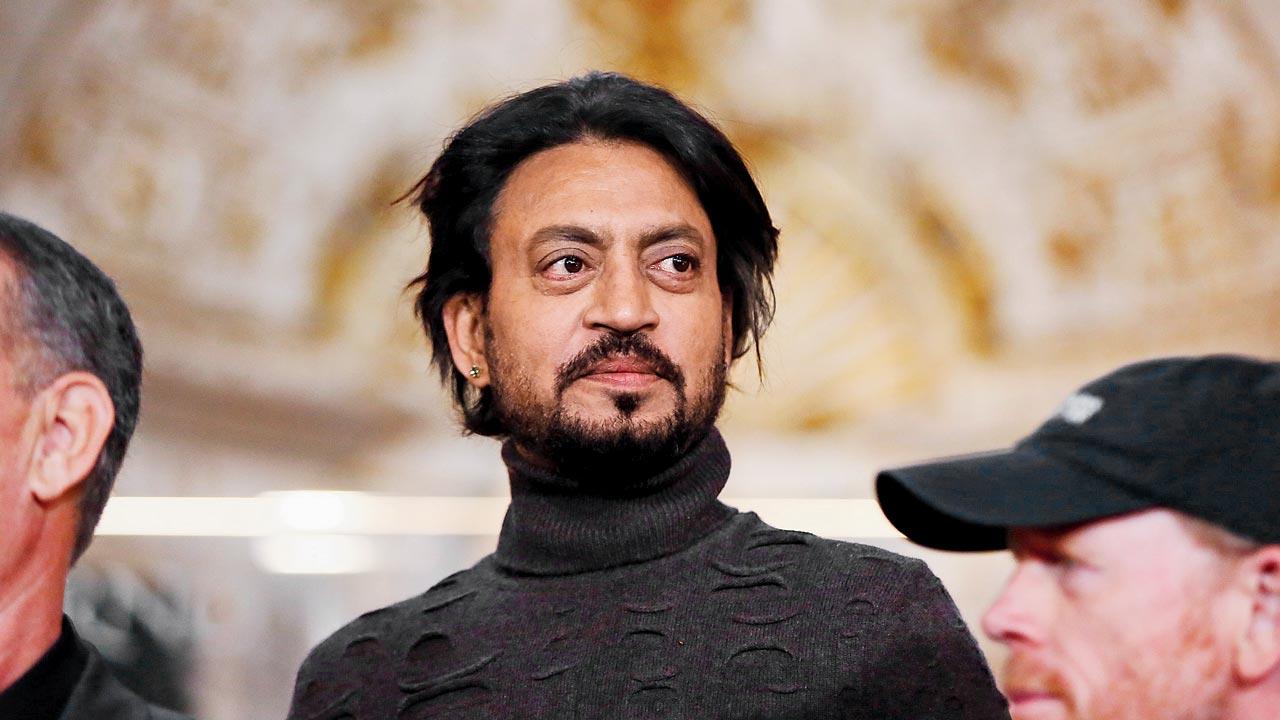 Pic/Getty Images
Pic/Getty Images
Social media is full of stories and articles claiming that the village’s name has been changed to “Herochiwadi,” meaning “the hero’s neighbourhood” in Marathi. However, when Sunday mid-day spoke to the village Sarpanch, Ashok Pingle, it revealed what can be described as both coincidence and misinformation.
The Sarpanch explained, “The village’s actual name is Hiruchiwadi, named after Hiru Pingle, the mukhiya of the local tribal clan, who fought the British alongside the tribal revolutionary Raghoji Bhangre. Local NCP leader Suresh Bodke, who has worked for the village, proposed that the village’s name should be changed to ‘Herochiwadi’ to honour Irrfan after he passed away. But we didn’t want that. Because firstly, we are the descendants of Hiru Pingle and take pride in the fact that the village is named after him. Secondly, if two letters in the village’s name are changed—from ‘Hiru’ to ‘Hero’—it may bring popularity to the village, but it would also mean that all our documents, from Aadhaar to property papers, would need to be changed as well… It’s too long a process for changing just two letters.”
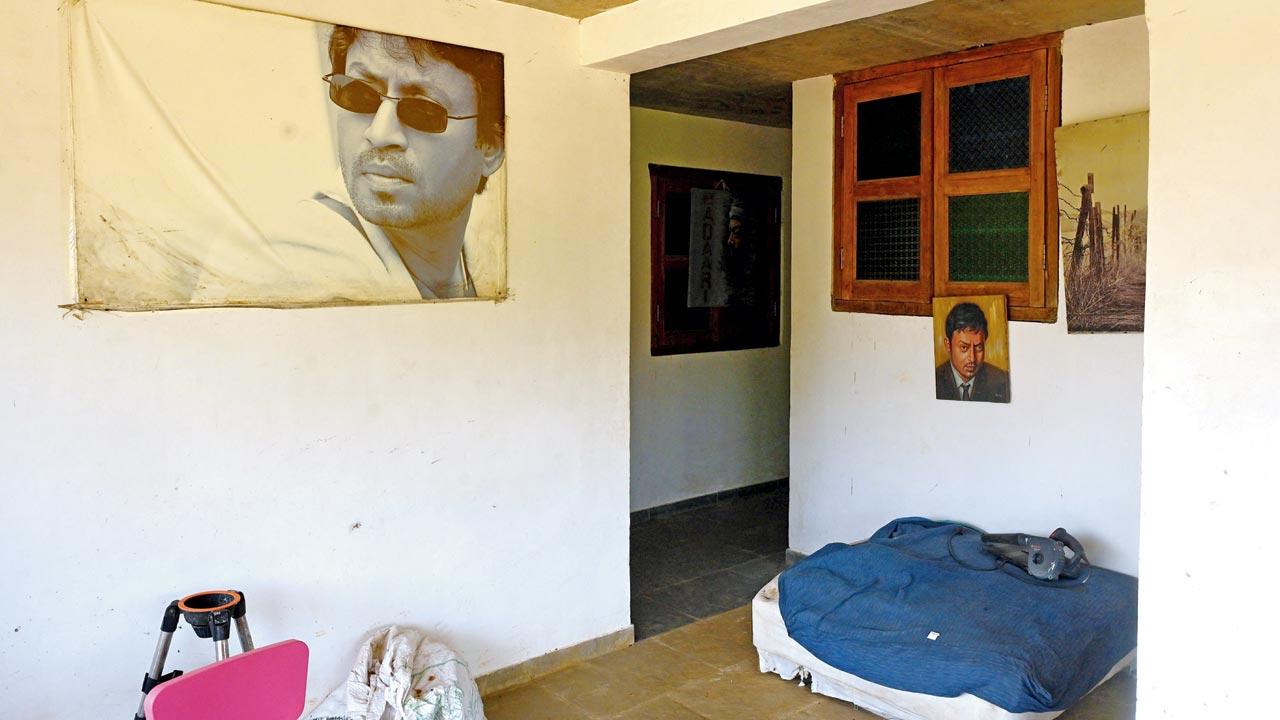 A seating area with actor Irrfan’s portraits near the entrance to his farmhouse in Hiruchiwadi village, Igatpuri. The farmhouse’s gates have no locks. Some of Irrfan’s belongings, such as an award he won, and other décor items lie in the open. However, nobody touches his belongings. Pic/Satej Shinde
A seating area with actor Irrfan’s portraits near the entrance to his farmhouse in Hiruchiwadi village, Igatpuri. The farmhouse’s gates have no locks. Some of Irrfan’s belongings, such as an award he won, and other décor items lie in the open. However, nobody touches his belongings. Pic/Satej Shinde
It’s a major coincidence that both “Hero” and “Hiru” have a very similar phonetic sound. The visit to the village was another lesson in the age of social media—do not trust everything you read online.
Regardless of the village’s name, the Sarpanch said the village loves its “Hero”. “The humility Irrfan showed by visiting houses around, providing livelihood to the locals by giving them jobs at his farmhouse, and his interaction with the children was something we did not expect from such a big film star. He could have arrived in his SUV with his bodyguards and chosen to stay in, enjoying the serene view and spending time only on his estate without stepping out. But he always chose to come to us.”
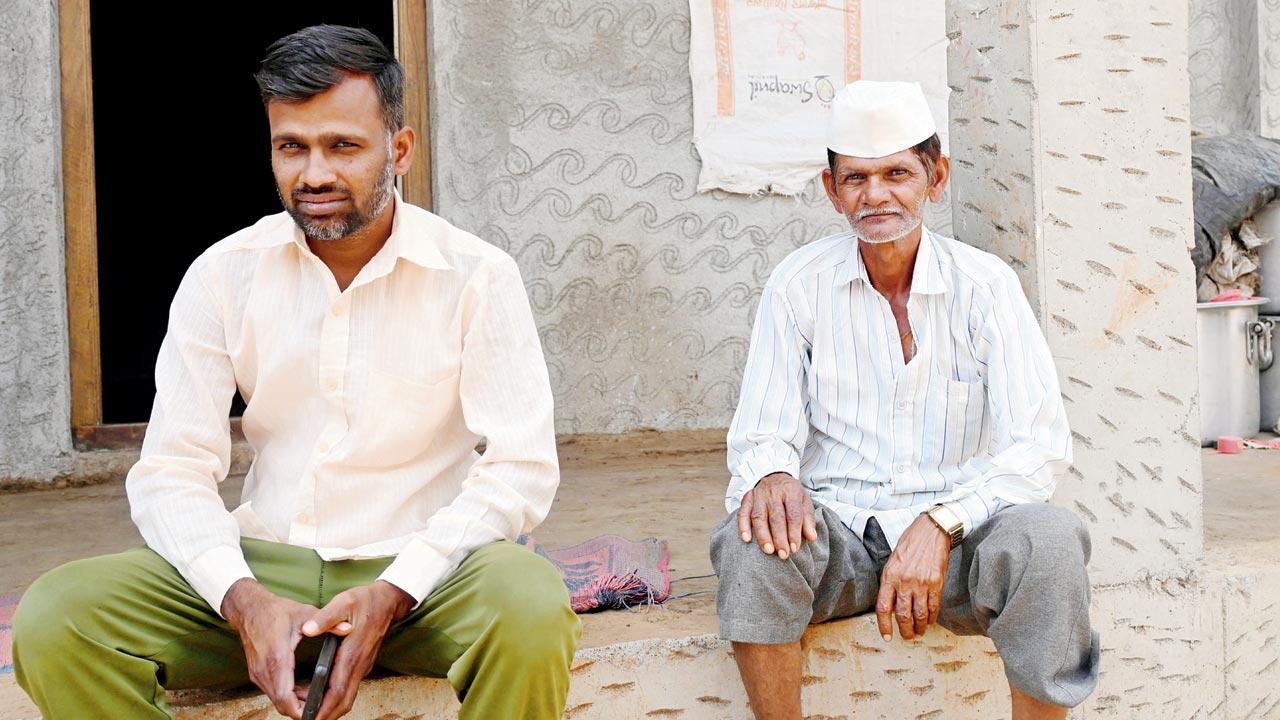 Sarpanch Ashok Pingle (left), along with his uncle Damu Pingle. Damu, a tailor, helped Irrfan with nearly all the drapery in his farmhouse. The Pingle family have been the caretakers of the farmhouse. Pics/Satej Shnde
Sarpanch Ashok Pingle (left), along with his uncle Damu Pingle. Damu, a tailor, helped Irrfan with nearly all the drapery in his farmhouse. The Pingle family have been the caretakers of the farmhouse. Pics/Satej Shnde
Ashok Pingle’s uncle, Damu Pingle, lives just a stone’s throw from Irrfan’s farmhouse, being the third house from his gate. When Irrfan learned that Damu was a tailor, he gave him the task of altering and tailoring all the drapery he had purchased for his farmhouse, including furniture covers for when the house would be closed. Damu refused to share how much he was paid for partly being involved in the “interior designing” of a film star’s house, but he mentioned it was more than all the money he made in the last five years.
When we asked Damu about his interactions with Irrfan, he said, “Aamcha bolnach zhaala nahi, kaaran tyaanna Marathi yaet nhavta ani mala Hindi bolta yaet nhavta. (We never spoke a word as he didn’t know Marathi, and I couldn’t speak Hindi).” But Irrfan’s staff did the translation for the two.
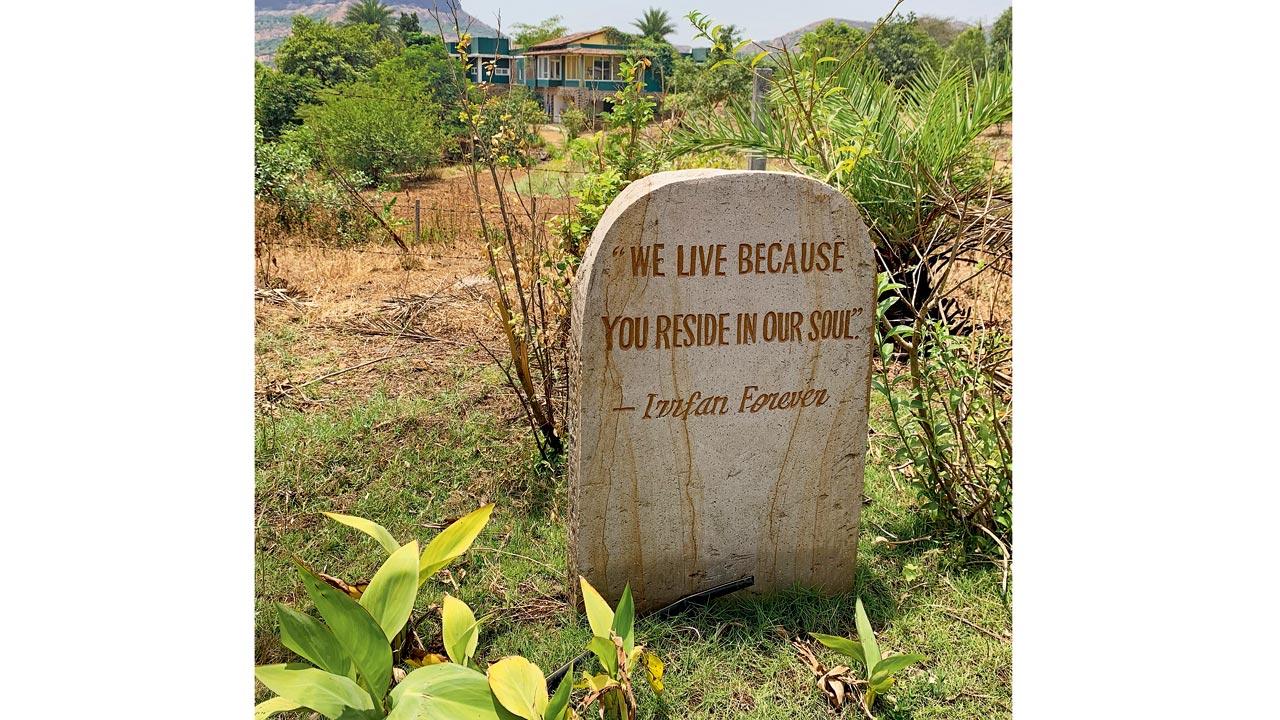 At the entrance of Irrfan’s farmhouse in Igatpuri, this epitaph is a tribute from his family, fans, and the village where he made his home away from home.
At the entrance of Irrfan’s farmhouse in Igatpuri, this epitaph is a tribute from his family, fans, and the village where he made his home away from home.
Another employment opportunity arose for Damu’s family as caretakers. It is his family that tends to the farmhouse during Irrfan’s family’s absence. As he showed this correspondent the farmhouse from outside, he further added, “I also worked on items like the tablecloths, kitchen cloths needed for regular use, and even doormats. Irrfan brought these items from outside, probably Mumbai, but they needed to be tailored to size. All the tailoring on this farmhouse is my work.”
But the real surprise came when he revealed that he had also stitched a few kurtas for Sutapa Sikdar, Irrfan’s wife. “She gave me a kurta that fit her well. I took the measurements and sewed many clothes for her for over two years.”
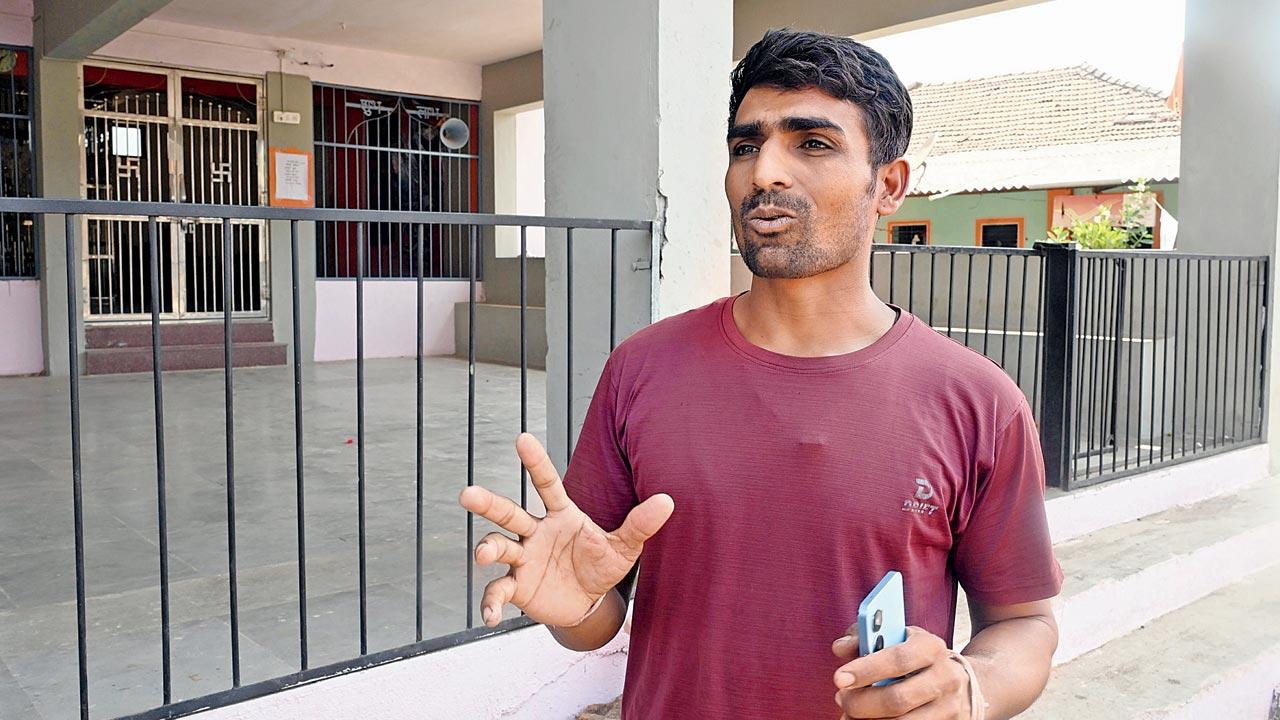 Eknath Pawar, a resident of the village received funds from Irrfan for the local Hanuman temple (in the background). He also did basic carpentry and construction work on Irrfan’s farmhouse, which earned him R12 lakhs, an amount he believes would be impossible to earn in the village
Eknath Pawar, a resident of the village received funds from Irrfan for the local Hanuman temple (in the background). He also did basic carpentry and construction work on Irrfan’s farmhouse, which earned him R12 lakhs, an amount he believes would be impossible to earn in the village
The trust Irrfan placed in the villagers was evident as we walked around his farmhouse. Villagers freely moved around, as there were no locks on the gates. A trophy he won for a film, along with various décor items, lay scattered on the façade of the farmhouse, yet nobody touched their beloved hero’s possessions.
Locals mentioned that Irrfan was deeply committed to community work. According to Subhash Mengal, a primary school teacher in the village, Irrfan was planning to have some films shot there, those that fit the village’s terrain—mountainous, rugged, yet green. Mengal says, “In one of the interactions I had with him, he mentioned that film shootings would generate employment for the locals. It’s a location just three hours away from Mumbai, and it may help filmmakers save costs on VFX or travelling to distant locations. It was a very interesting prospect. You can see how disconnected the village is, despite being at the border of three major districts—Nashik, Palghar, and Thane.”
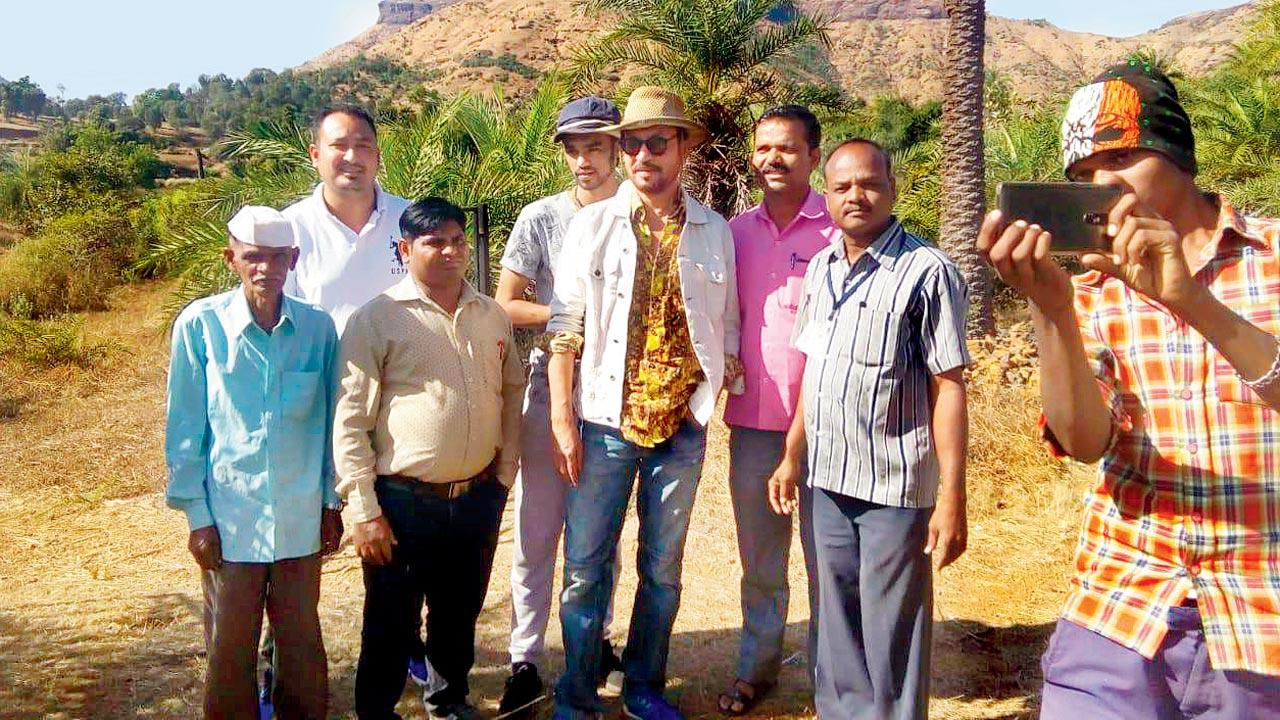 Irrfan and Babil (fourth from left), along with people from the village during one of his visits to Hiruchiwadi. Pic/Special arrangement
Irrfan and Babil (fourth from left), along with people from the village during one of his visits to Hiruchiwadi. Pic/Special arrangement
Though he never formally adopted the village, during his time here, Irrfan touched lives across all domains. A resident of the village, Eknath Pawar, told us that Irrfan had donated Rs 50,000 for a local temple, now the largest in the village. “We mentioned that the Hanuman temple needed renovation. We didn’t care whether the donation came from a Muslim, as it was god’s work. He never cared about religion either. The funds arrived within a few days, around the time when he was already sick. It didn’t come directly from him but through Sutapa Didi.”
But closest to his heart were the children of Hiruchiwadi. Bhavrao Bandu Bangar, the former headmaster of the primary school in the neighbouring village of Patryachawada, knew how big a star Irrfan was. However, his approximately 100 students had no idea who he was. In 2015, when Bangar learned that Irrfan’s farmhouse was nearly ready and that he would be arriving soon, he went to the farmhouse to request him to meet the students. “It may have been their only chance to meet such a big film star. Meeting an influential figure at a tender age can make an impact,” he tells Sunday mid-day.
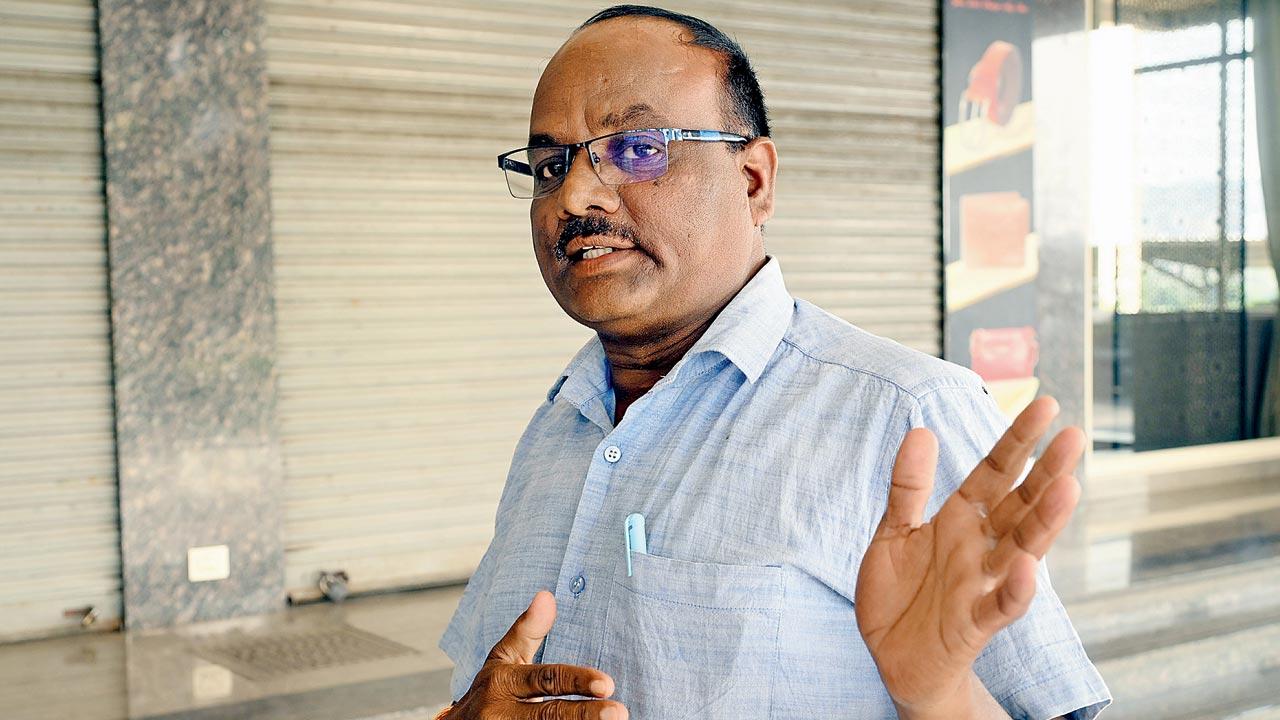 Bhavrao Bandu Bangar
Bhavrao Bandu Bangar
But Irrfan was seemingly busy that day, telling the headmaster, “I will come later in the day...” School ended at 5 pm, and the children waited until 5.30 pm, but Irrfan did not arrive.
Bangar says, “It was understandable. He is a busy man.” But, to his surprise, the next morning, Irrfan, along with his family, arrived at the school earlier than anyone else and waited for the students to come. Delighted that he had shown up with his entire family, the headmaster asked, “Why did you not come yesterday?” To which Irrfan replied, “I didn’t want to come empty-handed.” Bangar recalls, “He came with two cars full of school bags, stationery, sweets, and whatever he could get for the children from a nearby market in Nashik.”
A few years later, Irrfan visited the farmhouse again. By this time, the children knew he was unwell. Bangar told the students, “Hero aajaari aahe (Hero is unwell). Make bouquets for him from whatever you find on the farms.” The students got to work immediately, and within a few hours, a hundred bouquets made from local flowers and leaves were ready. Bangar informed Irrfan that the children had brought him something this time. Soon, a hundred bouquets adorned the façade of his farmhouse. “He started crying when he saw the gesture,” recalls Bangar.
This happened towards the end of the monsoon season, and Irrfan had noticed the children walking to school with plastic sheets or nothing at all during heavy rains. Bangar shares, “Ten months later, at the onset of the next monsoon in 2018, I received two massive cartons. The sender’s address was from Rajasthan, where Irrfan originally hailed from. I had never asked for it, but even while he was receiving treatment in London for his illness, he remembered the children and the fact that the monsoons had begun, knowing they would need raincoats to go to school. I never got to see him again, as Saheb was very sick.”
Today, the plans Irrfan had for the village sit stalled, which included basic infrastructure for shooting, proper roads till the Trilangwadi Fort, modern classrooms in the primary school, and much more. Locals say his family does not visit as often, and they mostly keep to themselves, unlike Irrfan. He once told primary school teacher Subhash Mengal, “The film industry is a lonely place. I am glad to have you all.”
However, the work he did for the village remains. The children still cherish fond memories of spending entire days, multiple times, with an international star. Some now aspire to become actors. Bangar says, “Without him, even the thought of learning theatre or becoming a film star would not have occurred to these children. We are close to Mumbai, yet so far.”
The questions posed to the residents about Irrfan make them light up with pride, knowing that their village is recognised now because of their hero.
Today, the gate of his farmhouse, which opens directly in the village, has a seat that nobody sits on, next to an epitaph that reads, “We live because you reside in our soul.”
Rs 50K
Amount Irrfan donated for a local temple, now the largest in the village
 Babil Khan
Babil Khan
'What difference am I making?'
“My father once said to me, ‘What difference am I making? What am I doing?’ This was way back, before Piku and Hindi Medium, before he bought the farmhouse. He was fearless about his beliefs and some of his beliefs were the creation of life, contribution to the sustenance of faith, and giving humanity some hope.
To create a future that we can look forward to, and not dread or be scared of.”
 Subscribe today by clicking the link and stay updated with the latest news!" Click here!
Subscribe today by clicking the link and stay updated with the latest news!" Click here!








